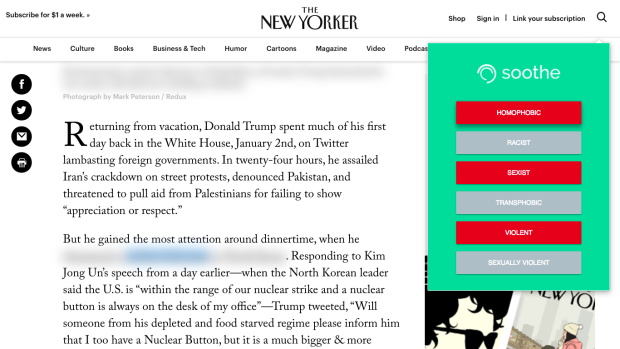Triggering language—including terms that provoke traumatic memories or harmful thoughts—endangers the mental well-being of people with conditions such as post-traumatic stress disorder (PTSD) and anxiety. While it is impossible to fully avoid upsetting words in day-to-day life, trigger-free spaces are crucial for providing solace and protecting mental health.
However, as Internet users know, the unmonitored and unpredictable nature of online content means there are no guaranteed Internet safe spaces. In response to this issue, McGill Engineering student Angus McLean, and his University of Ottawa partner Nikola Draca, developed a Google Chrome extension called Soothe that blurs out triggering content from users’ internet browsers.
So far, the response from both test clients and the media has been positive. Given the usual controversy surrounding trigger warnings and safe spaces, the enthusiastic reviews are a surprise. However, with Internet use as such an integral part of daily life, apps like Soothe are a logical next step in promoting mental health and well-being.
Although websites such as Facebook and Twitter already allow users to block individual words from their feeds, Soothe goes further. The app uses sentiment analysis, an algorithm programmed with a list of terms that it locates in sentences. If Soothe detects words from the list, it scans sentence contexts and blurs out material that could be triggering. For example, homophobic, racist, sexist, transphobic, or violent language can be blocked depending on user preferences. The app is particularly relevant on university campuses, where mental health concerns, such as anxiety, are increasingly recognized. It protects students who are often required to spend hours on the Internet daily, potentially running into triggering and harmful content.
In other cases where content censoring has been suggested in the interest of mental health, such as student petitions for trigger warnings for readings at University of Santa Barbara and Oberlin College, promoters have faced tremendous backlash. Professors at Oberlin College rejected the proposed trigger warnings, stating that they needed to challenge students and make them feel uncomfortable as part of their education. In another instance, an app similar to Soothe, called Silencer, aimed to make online news feeds more positive by removing certain words. It too faced criticism from users who argued that ignoring bad news isn’t a sustainable solution to people’s problems.
Although avoiding material that challenges one’s political views may pose little benefit, avoiding hate speech and microaggressions is entirely different. A major distinction must be made between controversial content that makes someone feel uncomfortable, and content that compromises mental well-being by triggering harmful thoughts or forcing someone to relive a traumatic past experience. The latter is what Soothe aims to block. Additionally, with Soothe, users only block pages in their own browsers and can uninstall the app anytime—content is not being censored from the public but simply for users’ own private use. The goal is safeguarding their mental health, not turning a blind eye to controversy.
Another critique of trigger warnings comes from a psychological standpoint: Some argue that avoiding triggers can exacerbate mental health issues. When considering this, one must recognize that Soothe’s users are not trying to avoid offensive content altogether—in an age of unprecedented communication and information-sharing, that’s impossible. But they can use the app to create one reliable, relatively-safe haven from it. Moreover, the unmonitored and often extreme or offensive nature of online content means that people do not have the option to choose how they come in contact with upsetting materials like they would in real-life interactions. Soothe empowers users with mental health concerns to interact positively with the Internet by allowing them to choose whether or not they encounter distressing material. With large aspects of school work, jobs, and recreation centering around the internet, feeling at-risk every time you open your laptop is a massive burden to bear. Apps like Soothe are vital for facilitating mental health while encouraging everyone to take full advantage of Internet resources.
Given Soothe’s consistently positive feedback, the market for this app and similar services seems to be on the rise. Moving forward, McLean and Draca want to enable Soothe to block images and video in addition to text. The Chrome extension is also designed to be adaptable and will allow users to flag new terms not initially considered by its creators. This app is an important tool for empowering people to enjoy the Internet without risking their mental well-being.









